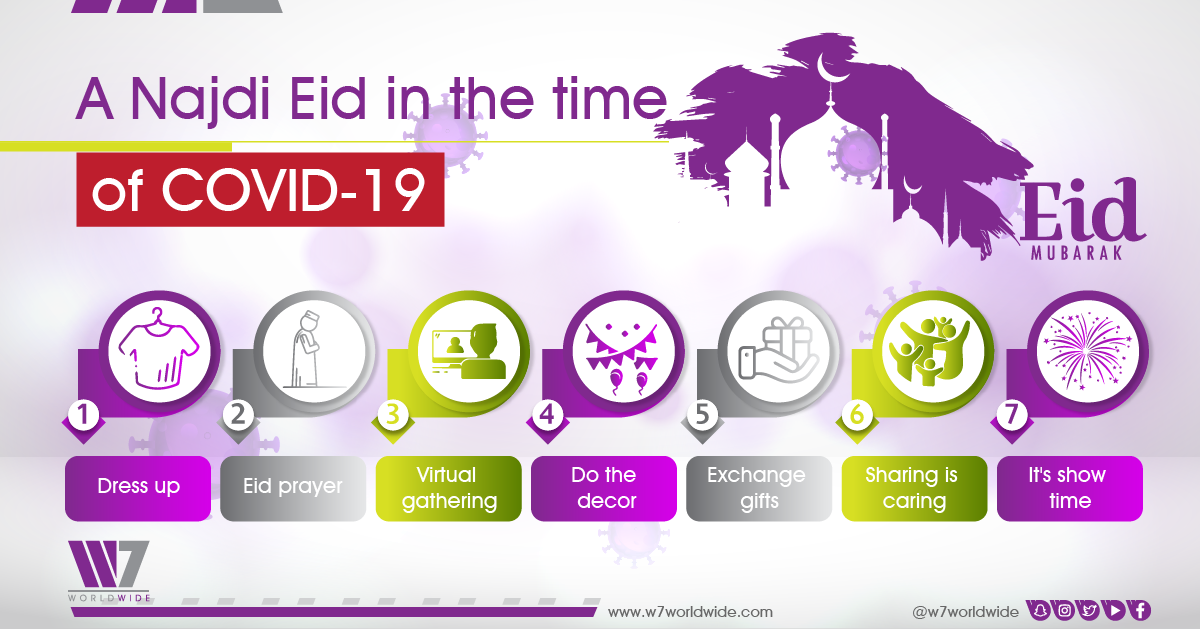The Muslim festival of Eid Al-Fitr is marked with distinct traditions and practices across the six provinces of the Kingdom, each with a unique charm of its own. What unifies these celebrations across Saudi Arabia’s many regions is the immense vigor with which they are undertaken and the spirt of hospitality and generosity that is displayed by Saudis on the occasion.
Every year, Eid in the capital city of Riyadh, situated in the Najd province, the central region of Saudi Arabia, would mean participating in the city-wide celebrations, fireworks, sword dances, and other festivities organized at various landmarks such as, the King Abdul Aziz Historical Center (National Museum), Al-Masmak fort and the adjoining antique souk, gardens, amusement parks, restaurants and other public locations.
In other regions of Najd, such as Al-Qassim, residents of a neighborhood gather on a street to greet each other and share food in what is an annual Eid tradition. Several rugs are spread out and huge quantities of food is brought by every household in the locality, which is then served and enjoyed over laughter and good vibes.
However, this year, with the ongoing pandemic and its related restrictions in place, things are expected to be slightly different, but different does not have to be boring. While this might not be the year for elaborate family unions and nights out, there are still a number of Eid traditions that you can enjoy at home.
- Dress up: Even if you have nowhere to go, you can still dress up in your best clothes (not necessarily new) in accordance with the sunnah (tradition) of the Prophet Muhammad (peace be upon him).
- Eid prayer: The special Eid prayer can be performed at home in a congregation consisting of family members, and so can be the sermon, which can be delivered by the head of the family.
- Virtual gathering: If visiting friends and other family members is not an option, fret not. You can still hang out with your relatives and others on a group video calling app such as Zoom and feel close to each other.
- Do the decor: Decorate your house for the occasion no matter what. Put up lanterns and candles, dust up the rugs and curtains and bring out those silk table covers and pillows. Get in the festive mood and spread cheer in the house.
- Exchange gifts: In Saudi Arabia, gifts are often exchanged between family members and friends during Eid Al-Fitr. Children customarily receive “Eidiyyah” (a small amount of money) from their elders. While you can still physically gift your immediate family members who live with you, for others, you can order gifts online and have them sent to their location. Some of the popular Eid gifts include: Dates, chocolates, date and nut-filled cookies, pastries and cakes, oud and bakhoor (incense), cosmetics, perfumes, electronics, and traditional clothes.
- Sharing is caring: Eid is an occasion that calls for special food preparations. Let this year be no different. Prepare and serve a sumptuous meal for your family, while being mindful of those who may not be as blessed. Generosity and kindness are also from the traditions of the people of Najd, who share meals even with absolute strangers, ensuring that no one goes empty stomach to bed on this special day. One should take great care to safely deliver foodstuff to the needy and poor people during this pandemic.
- It’s show time: By evening, you are more likely to miss the shopping malls and restaurants that have been a part of your Eid celebrations year after year. Try some entertainment options at home, for example, watch a good family movie on the television or play games, especially to keep the little ones happy and excited.
The joy of Eid Al-Fitr may have been partially marred by COVID-19, but with the right spirit and positivity, you can still make the most of this festival by creating memories for you and your loved ones to cherish forever.

